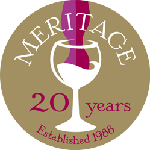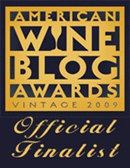Meritage Madness
|
I swore it wouldn't happen. I crossed my heart, hoped to die, stuck a needle in my eye . But, somehow it did. Despite my attempt to get off all industry boards some years ago, I'm back on and in a big way. But now it's for an organization that is very much a part our winery's red wine philosophy. Let me introduce you to the new Chairman of the Meritage Association. (It so So, try as I might, I just couldn't say no. If you're new to the term, Meritage is the name used for categorizing hand-crafted blends made from traditional grape varieties grown in Bordeaux, France. If it's a red wine (which most are) that means the wine is comprised of Cabernet Sauvignon, Merlot, Cabernet Franc, Petit Verdot or Malbec. For a white wine, the blend must include Sauvignon Blanc, Semillon and Sauvignon Vert, but these are few and far between. Most are red wine blends. A group of vintners selected the name 20 years ago in an attempt to give a distinctive classification to this category of wines. Was it necessary? You bet, as the TTB (formerly known as the BATF or Bureau of Alcohol, Tobacco and Firearms) requires wines that are less than 75% of any given variety, be named simply, TABLE WINE. Not the most glamorous or descriptive of terms, particularly considering some of the world's finest wines are blends of the traditional Bordeaux grape varieties. And, they do not necessarily adhere to the 75% rule. Now, we're regrouping and trying to come up with a new plan for the next 20 years. How can we reach out to new wine lovers? How can we best serve our winery members, who make and sell Meritage wines? And what, if anything, should we do to promote these incredibly complex wines that represent a winery's most creative and artistic form of winemaking? With over 200 winery members in six different countries, it's time to rethink our mission and redirect our efforts. The art of blending is here to stay, and Meritage wines are at the forefront of this movement. If any of you have a suggestion, I'd LOVE to hear. I promise to pass it on to the Chairman! | ||||||
|
8 Comments
Leave a comment
welcome!
This is a blog about what it's really like to be in the wine industry...so sit back, take a sip and enjoy!

about me

our wines

our winery

our events

contact me

privacy statement

favorite posts
A Lifetime in Wine
Top 10 Traits of the Successful Family Winery
The Dreaded Family Meeting
Board Meeting Jitters
Is the Future of the Winery in Danger?
The Case of the Overweight Bottle
Wine and Dementia
Wanted: Talented (Normal) Individual for Family Owned Winery
A Sea of Wine
The Heroes of Our Industry
monthly archives
subscribe
Hopes & Dreams
Owning a Coastal Cottage
Sailing for 6 Months
Getting a 100 Point Score

Favorite Haunts
Coast of Maine
Dry Creek General Store
Dry Creek Kitchen
Healdsburg Bar & Grill
Spoonbar
Sonoma Country Antiques
Baci Cafe & Wine Bar
The Farmhouse
Istanbul's Grand Bazaar
Bad Ass Coffee
Bistro Ralph

Bits of Press
Food & Wine Magazine
The Wine News
Wine Enthusiast
Wine Spectator
Press Democrat
Sunset Magazine
Connoisseurs' Guide
Dan Berger's Vintage Experiences
Cruising World Magazine
Oprah Magazine
The Washington Post
Coastal Living Magazine
Wine & Spirits Magazine
People Magazine
SAG Awards Magazine
Forbes Magazine

Favorite Magazines
Coastal Living
Down East
Sunset
Country Living
Quarterly Review of Wines
Wines & Vines
Wine Spectator
Wine Enthusiast
California Grapevine
Connoisseurs' Guide
Practical Winery & Vineyard
WineReviewOnline
Vineyard & Winery Mgmt

Blog Buddy List
Fermentation
Hip Tastes
Pinot Blogger
All The Best
Julia Flynn Siler
Vinography
Winery Web Site Report
The Pour - Eric Asimov
Dr Vino
Steve Heimoff
Start Up Ladies
Good Wine Under $20
Blind Muscat
The Wineroad Blog
Gabe's View
Wine Peeps
Vici Vino
Cellarmistress' Cellar Talk
Uncork Life
WineVine-Imports Blog
The Wine Witch
SOURMASHED

Honorable Mentions
Fermentation
Wilma Hits The World of Blogs
Most Intriguing New Wine Blogs of 2008
Midwest Wine Guy
Winery of the Month
Julia Flynn Siler
Meritage wines - and a fascinating glimpse into family business
Winery Web Site Report
New Winery Blog: Wilma's Wine World
Start Up Ladies
Insider's View of Family Owned Dry Creek Vineyard
The Glue that Keeps the Whole Thing Going
Atlanta Dish
Blog of the Week
Blind Muscat
The Merits of Meritage
Wineries.net
Boston Wine Expo exhibitors, and the reason why winemakers are so darn happy





Jack said:
August 1, 2008 10:56 PM
Perhaps you might simply consider dropping the Meritage term. Why? Because I don't think wines labeled Meritage have a positive reputation. Why pour money into that? That would be Meritage Madness, right?
(And, let us not forget the most consumers mispronounce meritage.)
I think it's smarter for each winery to come up with a proprietary name for their Bordeaux Blend, and list the exact blend on the front or back of the label.
But hey, don't listen to me - commission a poll and see for yourself.
Keith L. said:
August 2, 2008 8:20 AM
Yes, I think at this point "Meritage" has connotations just as down-market as "Table Wine." You would never see it on a wine like Dominus or Monte Bello, for example.
Lyle Fass said:
August 2, 2008 8:35 AM
Meritage is to California wine like Red Bicyclette is to French wine.
Alder Yarrow said:
August 2, 2008 3:05 PM
Last time I had a wine labeled Meritage that was any good was 1997.
Kim (aka Wilma)
August 3, 2008 9:14 AM
I may just have to challenge you on that last one Alder! Our 2004 Mariner is awesome...have you had it?
Thank for commenting everyone. Clearly the Chairman has her work cut out for her! Based on your comments, it seems like the Meritage category suffers from a bit of an identity crisis. Many, if not most, wineries do choose to use a proprietary name, just like we have with our Mariner. And we list the varietal percentages on the back label. But, when these wines are sold in stores or on wine lists, if there wasn't a "Meritage" category or heading, where would they be listed? They shouldn't be listed under the Cabernets, and they're different than other blends made from Rhone varietals, etc. So, don't you think it helps overall to have the Meritage classification as a designation for these blends?
Karen said:
August 4, 2008 11:58 AM
As an average consumer of wine, I never knew that Meritage was considered "down market". I appreciate seeing that label on wine lists as it cues us to look at creative, interesting options. We know which varietals may be in it and that helps us too to know what kind of tastes to anticipate. And I believe I have enjoyed many delicious wines called Meritage. If it was a proprietary name, it could be any varietals and so it takes more reading of labels to know if we want to order it. Since most wine lists do not contain much information, it might be tedious to ask to bring several bottles of wine to the table so we can read labels. Meritage does mean something. If that name is gone, how will the industry help with other words that might appear on restaurant lists and be descriptive enough? And please do not say to ask the sommolier. As knowledgeable as they are, they are not at all restaurants--even really nice ones--and they do not always pick what I like. I want to be able to pick for myself.
Marco Montez said:
August 5, 2008 11:24 AM
I agree that Meritage really hasn't reached the recognition that its members probably want/expect. I have personally never been to a restaurant here in the Northeast that lists Meritage as a separate category on the wine list. Neither has ever a retailer at a wine store recommended to me a Meritage. In my opinion, convincing restaurants and retailers that they NEED to have a Meritage category offering would be a great accomplishment. This may require a focused effort from a marketing and sales perspective. Does the organization hold consumer tastings like for example the PS I love you group does? And obviously by now a case or at least a few bottles of the best Meritage should be in the mail on its way to bloggers like Alder.
JohnLopresti
August 8, 2008 5:11 PM
The membership roster at the meritage association website reveals a lot. Wilma should have fun adding a new dynamic to advancing recognition of the meaning of the title as a global designation of perfect blending. Bordeaux wines accomplished some subgradations by mandating labels specifying somewhat forthcomingly whether the bottling was at the same estate on which the fruit grew, whether the crop was recognized preharvest as extraordinary quality based on standardized rating of the year's weather, soil and pest conditions, and fruit sample assays. In sum, a lot of things some members of a global organization promoting a new name like meritage will try by both political methods and industry influence to skew. What a challenge to lead a new organization with such a creative idea in a very stratified industry, encompassing some parts of the world which can raise own-rooted vines, or apply more pesticides than in other nations, or permits dilution with water of musts, or sugaring with non vinifera sugars.
At a recent street fair a locally bottler with a local vineyard had donated tastings from bottles of out-of-region blends of the most undistinctive sort, but the overarching label recently won a competition with some products in its reserve cuvee with totally different sourcing. The street tasting featured sub$5./bottle product; the tasting winner price was $60./bottle; same winery, deceptively similar labels.
Meritage can compete against that kind of chicanery and advance quality grades of meritage wines globally if the meritage organization permits itself some ways to express by label and perhaps by gradated events and tastings, the differentiated quality products available labeled meritage. It looks like a lot of work, but holds great promise. I can understand why they turned to Wilma for help.